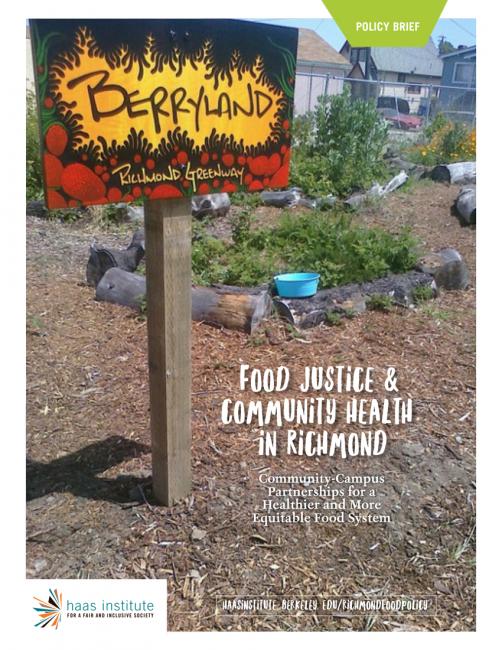HAAS INSTITUTE ANNOUNCES NEW REPORT RELEASE ON COMMUNITY-CAMPUS STRATEGIES FOR FOOD JUSTICE AND COMMUNITY HEALTH IN RICHMOND, CA
BERKELEY, CA/APRIL 28, 2016. The Haas Institute for a Fair and Inclusive Society is excited to announce the upcoming release of our report, “Food Justice and Community Heath in Richmond: Community-Campus Partnerships for a Healthier, More Equitable Food System.” The release of this report will take place on Thursday, April 28th, from 3:30pm to 5pm in the Multicultural Community Center in the Student Union at UC Berkeley.
This report is the culmination of more than three years of work in Richmond in partnership with local community leaders and organizations. It outlines strategies that can facilitate more engaged partnerships between UC Berkeley and surrounding Richmond community in order to realize transformational food system change. With the announcements of the Berkeley Global Campus (BGC) in Richmond and Global Food Initiative (GFI) from the UC Office of the President, there is great promise to align those initiatives’ values of sustainability, equity, and global inclusion with the aspirations of local community in Richmond. The report, authored by Nadia Barhoum, provides a general overview of food systems and community health, followed by a description of the current landscape of existing food challenges and food equity efforts in Richmond and food-related work at UC Berkeley and within the Global Food Initiative. Lastly, it presents strategy recommendations that can bridge these broad-based initiatives housed within community, city government, and academia in a way that includes and centers the needs of marginalized communities.
“I’m hoping this report can provide a blueprint for campus-community partnerships to advance food system change. There exists a critical need for increased collaboration and strategy-building in food-related work on-campus as it relates to community needs,” said Barhoum. “UC Berkeley should have a strategic plan, aligned with its mission as a public institution, to serve local communities and utilize the incredible resources and human capital on-campus to build alternatives to the current, broken food system within our local communities.”
“The Berkeley Global Campus at Richmond Bay represents more than a development project – it is an opportunity to leverage the largest public investment in the Richmond community since World War II to serve the broader community goals,” said john a. powell, Director of the Haas Institute for a Fair and Inclusive Society. “Building the power and capacity of marginalized communities to engage in transforming these structures is the most sustainable and effective way to create inclusive opportunity and equitable community health and expand opportunity for all.”
Members of the media are invited to the report release. Following the report presentation, there will be a discussion on next steps for shared work toward food system change in Richmond.
Copies of the report are available to interested members of the media. For a copy, please contact Rachelle Galloway-Popotas at galloway.popotas@berkeley.edu.
The report can also be downloaded here.
###
Contact: Rachelle Galloway-Popotas
Tel. 510.642.3326
Email: galloway.popotas@berkeley.edu
About the Haas Institute for a Fair and Inclusive Society
The Haas Institute brings together researchers, organizers, stakeholders, communicators, and policymakers to identify and eliminate the barriers to an inclusive, just, and sustainable society and to create transformative change toward a more equitable nation.
###





